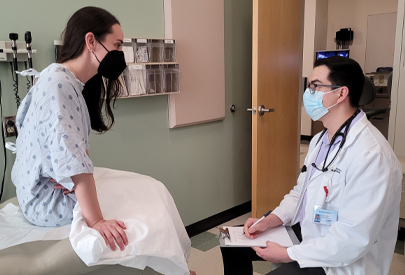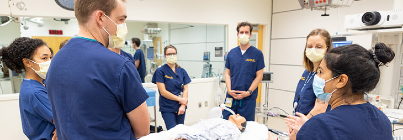Standardized Patients Frequently Asked Questions
See Answers to Common Inquiries
 The UC Davis Health Center for Simulation and Education Enhancement facilitates the standardized patient program utilized by the UC Davis School of Medicine and the Betty Irene Moore School of Nursing at UC Davis. Here are some answers to frequently asked questions (FAQs) about the program.
The UC Davis Health Center for Simulation and Education Enhancement facilitates the standardized patient program utilized by the UC Davis School of Medicine and the Betty Irene Moore School of Nursing at UC Davis. Here are some answers to frequently asked questions (FAQs) about the program.
To learn more about the standardized patient program, please email standardizedpatients@health.ucdavis.edu or call 916-734-5201.
What is a standardized patient?
A standardized patient, or SP, is someone who memorizes the details of a patient case and plays a believable improvised encounter as that patient. Standardized patients are given a script to memorize that includes details such as symptoms, medical history, social history and family history. The encounters take place in a clinical setting with a medical or nursing student acting as the health care provider.
What is the value of being a standardized patient?
Being a standardized patient is a key factor to furthering the education of health care students and shaping the future of the health care system. It provides a safe space for students to practice their clinical reasoning, interpersonal skills and non-invasive exam maneuvers.
What is required to become a standardized patient?
- Must be reliable and punctual
- Adhere to policies and protocols
- Attentive to scripted details and training instructions
- Full engagement and focus during training sessions
- Conscientious, respectful and focused while working on campus
- Have great communication and interpersonal skills
- Able to portray a specific standardized patient role, for potentially multiple consecutive times, providing each student with the same patient experience
- Keep information such as scripts and student encounters confidential
- Exhibit no biases towards race, ethnicity, religion, age, appearance, gender identity or sexual orientation
- Have excellent memory recall for scripted information
- Willing to be videotaped for educational purposes
- Understand the focus of each encounter is on the student, and the goal of each encounter is to further the educational experience for the student
Must standardized patients be a certain age?
Standardized patients must be at least age 18 to participate in the program. Otherwise, there is no age limit as we keep our standardized patient pool diverse for the most realistic representation of the community.
Do participants need to be actors or have prior acting experience?
People do not need to be actors or have prior acting experience to be outstanding standardized patients. This work can build on skills actors are familiar with such as memorization and improvisation, but being an actor is not a prerequisite for the program.
Is prior knowledge about medicine or health care required?
Prior knowledge about medicine or health care is not required. Each case script has all the information needed to portray the case correctly. All medical information is covered during the training session and clairification on any terms or aspect of the case is addressed as needed at that time.
Is it important to disclose previous health history?
It is important that our standardized patients disclose their previous health history and we request this information during the onboarding process. This helps our team determine if there is previous health history that might affect the case portrayal or cause issues for a student during the physical exam. For example, if a standardized patient has a condition that causes loss of sensation in their feet, and they are asked to play a person with normal sensation, this could pose an issue that would preclude the patient actor from participating in that specific case. Medical history such as surgical scars or other minor issues can typically be worked around, as long as our team knows in advance so that we can make the necessary adjustments.
How are standardized patients trained?
Our standardized patients receive a detailed case script with all of the pertinent information. This is followed by a training session with other standardized patients who are also working with the same script. This ensures we are able to standardize portrayals and address any case questions.
How do standardized patients know what to do and say?
For each scripted case, there is an in-depth training session that addresses all the specifics of what is required. Standardized patients then engage in a long-form, given-circumstances improvisational encounter with the students based on the scripted information and the parameters set forth during the training session.
What type of physical exams are performed?
Standardized patients are asked to participate in non-invasive physical exams, which can include things such as listening to the heart and lungs, testing reflexes and sensation, examining the abdominal area, assessing strength and range of motion for muscles and joints, and other such assessments.
Must standardized patients remove their clothing?
Standardized patients are required to change into a patient gown since all clinical encounters take place in an exam room. However, standardized patients are asked to keep their undergarments on underneath the gown (e.g., underwear, shorts, bra or sports bra).
Do standardized patients grade the students?
There are cases that require standardized patients to complete a checklist to verify what a student did or did not do during an encounter. Some cases also require productive written or verbal feedback on students’ interpersonal skills. Standardized patients may accept or decline these cases based on comfort level with cognitive recall or offering feedback.
Do the students know that standardized patients aren't real patients?
The students understand that our standardized patients are not real patients and that the ailments portrayed are not real.
How often does a standardized patient work?
Standardized patients are independent contractors and the work offered is sporadic in nature. Patient actors are contacted for sessions based on scripted demographic and skill level requirements. This means that they may work as often as once a month or a little as once a year. There is not a guaranteed number of days or hours.
Are standardized patients paid for their work?
Absolutely! We compensate very well. Specific pay rates are discussed during the onboarding process.
Can a standardized patient pass on a role?
Standardized patients are not required to play every role we reach out to them about and passing on a role does not hinder their ability to work in the future. We only ask that our standardized patients maintain communication and let us know if they are unable to participate in any sessions offered.
Does the program require vaccination against COVID-19?
We require proof of vaccination against COVID-19 before hiring our standardized patients.


